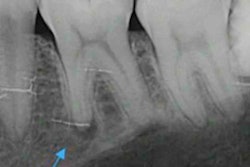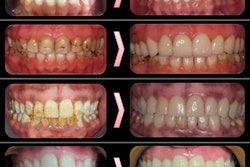
The severity of tooth clenching and grinding that patients experience may be associated with their vitamin D levels, according to a study published February 6 in Clinical and Experimental Dental Research.
Blood tests revealed that individuals with low levels of 25-hydroxyvitamin D (25[OH]), the metabolized form of vitamin D that is used to assess deficiency, reported having moderate and severe bruxism, the authors wrote.
"It appears that there is a significant relationship between bruxism and the level of 25-hydroxyvitamin D in the blood," wrote the authors, led by Bushra Allaf, of the Department of Oral Medicine, Faculty of Dentistry, University of Damascus in Syria.
Worldwide, it's estimated that more than 50% of the population is deficient in vitamin D. This essential vitamin is found in foods, including fatty fishes, like salmon, and eggs and dairy products. Low concentrations of vitamin D have been linked to a greater risk of heart disease, cancer, neurodegenerative diseases, and death.
Some researchers surmise that vitamin D also plays an integral role in brainstem control during sleep due to numerous nuclei that contain high levels of vitamin D receptors. Therefore, vitamin D levels may be related to sleep disorders, like bruxism. Though characterized by teeth clenching and grinding, the root of bruxism has been associated with multiple factors, including psychological issues and sleep disruption.
To study the correlation between bruxism and vitamin D levels, researchers tested the blood of 100 participants. Of those participants, 76 reported experiencing bruxism and 24 did not. For vitamin D levels, concentrations of less than 20 ng/ml were considered deficient, levels between 21 and 29 ng/ml were considered insufficient, and concentrations between 30 and 150 ng/ml were considered as sufficient, the authors wrote.
Of the participants, 43% had vitamin D deficiencies. After analyzing the data, the authors found an association between deficient levels of vitamin D and the severity of bruxism. More individuals reporting moderate and severe bruxism were deficient in vitamin D concentrations than those experiencing no symptoms or other levels of tooth clenching or grinding, they wrote.
| Bruxism severity in people with deficient concentrations of vitamin D | |
| Bruxism severity | No. of patients |
| Extreme | 4 |
| Severe | 14 |
| Moderate | 18 |
| Mild | 3 |
| None | 4 |
The study had limitations, including that the diagnosis was based on clinical exams and self-reports from participants. A definitive diagnosis of bruxism should be supported by instrumental approaches, clinical features and exams, and self-reports. However, instrumental approaches were not available, the authors wrote.
"Generally speaking, bruxism activity has been associated with a deficiency of 25(OH) D as observed in our recorded measurements," Allaf and colleagues concluded.




















